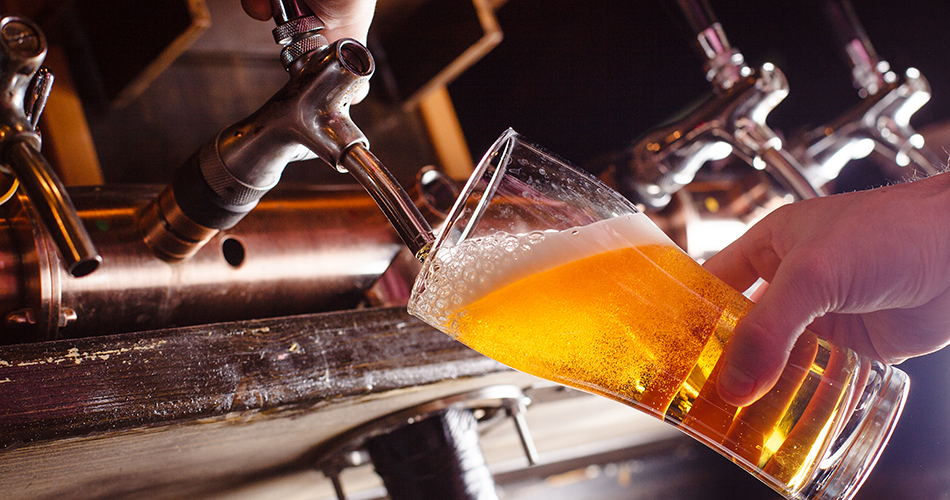
Scientist Q&A: What you need to know about the new 'hoppy beer' study
There’s been a breakthrough in the science of beer. With growing evidence that molecules in “hoppy” beers can reduce weight and insulin resistance, a new Scripps Research study in Molecular Metabolism offers an explanation why.
We sat down with study leader Enrique Saez, PhD, associate professor, and Bernard Kok, PhD, research associate, to learn more.
September 25, 2018
What makes hoppy beers special?
Saez: Hoppy beers, like IPAs, contain compounds called isohumulones. These compounds seem to have health effects, so we decided to study how they interact with bitter taste receptors in the gut.
Wait—taste receptors in the gut?
Saez: Yes! So, a lot of us were under the impression that taste receptors were only present in the mouth, but recent research shows that many other tissues express taste receptors, bitter taste receptors in particular.
These receptors are thought to perform different functions in different tissues. For example, bitter taste receptors in the mouth are there to tell us that a compound may be poisonous and we should avoid it. Not everything that’s bitter is a poison, obviously, but that’s what we think. It might be a defense mechanism that evolved to protect children from eating toxic plants until adults teach them which foods are safe.
In the gut, there is literature suggesting that bitter taste receptors control secretion of hormones that regulate your appetite and how quickly food moves down the intestinal tract. This could have developed as a mechanism to reduce the absorption of poisons.
And now we’re wondering if this response might be manipulated pharmacologically. We show in this study that manipulating these receptors could have benefits for metabolic disease.
How did the new study work?
Saez: We worked with a molecule synthesized by a company called KinDex Pharmaceuticals. This was a synthetic version of isohumulone molecules found in hops that give beer its bitter flavor.
Studies in mice and people have shown that mixtures containing different isohumulones can have benefits for treating type 2 diabetes. But because we never had the isolated molecules, it was very difficult to figure out which isohumulones were working and how they worked.
The benefit of this synthetic isohumulone compound is that it’s pure. It’s a great tool for discovering new biology.
What happened when you gave this compound to the mice in your study?
Saez: The compound appeared to accelerate their metabolism, so they lost weight without eating less. Independent from the weight loss, the mice showed increased insulin sensitivity within four days. This happened because the compound activated a bitter taste receptor in the gut, which stimulated the secretion of hormones that talk to the brain and the pancreas.
Kok: Our paper shows that targeting bitter taste receptors in the intestine is probably a viable way to try to find new drugs to treat metabolic disorders such as obesity and diabetes.
Should people be drinking more hoppy beers for the health benefits?
Kok: Well, the one limitation of this study was that we couldn’t study human intestines to see if they have the same bitter taste receptor that this pure compound activates in mice. Studies with isohumulone mixtures suggest that the receptor is there, but we can’t yet be sure if our pure compound works the same way in humans. It’s something that we are very interested in exploring.
It seems weird that there’s still so much we don’t know about the gut. What else would you want to study?
Saez: For this study, we focused on the secretion of a hormone called GLP1, which has benefits for glucose levels. But there’s a lot more that we want to know. Activation of this receptor influences the release of several other hormones that are less studied. We’d like to know the roles of those hormones in remodeling metabolism.
Are you two IPA drinkers?
Saez: I am!
Kok: I’ll drink them. The interesting thing about IPAs is that it’s hard to overdrink. You tend to stop.
Saez: You feel full, and the hops are part of the reason. You get more of these isohumulone compounds, which we think make you feel full. That doesn’t happen with lighter beers.
So your gut is telling your brain to stop?
Saez: Exactly. Your gut is talking to your brain!
Read more: The San Diego Union-Tribune -- Beer's bitter delight is tasted in the gut
For more information, contact press@scripps.edu

